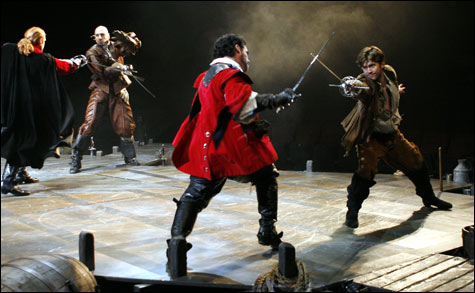
SWASHBUCKLING YET SLUGGISH: This Dumas has a Cliffs Note book and a workmanlike score.
|
Some ideas die hard — especially when they’re good ones. The British team of composer George Stiles, lyricist Paul Leigh, and librettist Peter Raby (a Cambridge lecturer, no less) has been tinkering with a musical based on The Three Musketeers for more than a decade, working on it in the UK, Switzerland, and Denmark before getting the thing mounted in San José in 2000 and at Chicago Shakespeare Theater last December. The swashbuckling yet somehow sluggish staging at North Shore Music Theatre (through September 9) is a co-production with Chicago Shakespeare Theater, though the director and the actors are new. Given the worldwide money-bagging success of Les Misérables, which would seem to be the show’s role model, you can see why the creative team keeps working and reworking. But even 10 years in, this Three Musketeers has more the clank than the whoosh of a sword.
The show is shorthandedly faithful to Alexandre Dumas’s 1843-’44 serialized novel set in the 1620s, the plot of which it lays out almost in its entirety, from Musketeer wanna-be d’Artagnan’s farewell to Gascony to the rescue of Queen Anne’s diamonds and honor to the death of the evil if bewitching Milady to the retirement of the three amigos of the title. Just about the only thing on the cutting-room floor is the powerful Cardinal Richelieu, here little more than a wraithlike figure hovering at the edge of the intrigue and hoofing it up in a few of the dance numbers. Still, the book is like a Cliffs Notes version of Dumas’s tale, hitting the high points without making much impact. (Raby is also the author of a non-musical adaptation of the material, and without the songs he may have had more leg room for character development.) Moreover, this Three Musketeers is almost devoid of the irony that enlivened the 1973 Richard Lester film. (I missed the 1993 Stephen Herek one, but, really, Charlie Sheen?) We get to know very little about the three Musketeers, except that Aramis is a once and future priest, Athos has been embittered by love, and Porthos is the Sancho Panza of the trio (not to be confused with Planchet, Sancho Panza to the trio and d’Artagnan). For its theme, the show sticks with the coming of age of the young Gascon, who learns that heroism is more complicated than he thought.
Then there is the workmanlike score, which is as devoid of the melodramatic sweep of Les Mis as it is of the whimsical charm of Stiles’s Olivier Award–winning Honk! “The Life of a Musketeer” is a lively number, with some nice harmonies — which the creators must know, since it turns up three times. “Who Could Have Dreamed of You?”, the second-act love duet for d’Artagnan and Constance, the queen’s seamstress whom he loves at first sight, is attractive in its swoony way. But one wants more of the tough and scathing “Take a Little Wine,” in which Athos reveals his former relation to Milady — this is a song that both etches character and tells us something we need to know. Too many numbers — “Riding to Paris,” “Paris by Night” — are just unremarkable gallops or slinks from one place to another, vaguely suggesting suspense or danger or urgency or intrigue.
There is some crack swordplay (and sword-on-sword bonding) in well-versed British director Francis Matthews’s production, which features fights by ensemble member Bryce Bermingham and less bristling choreography by Dennis Callahan. The costumes have rough-hewn grandeur. The wine barrels double cleverly as steeds. And within the broad outline of the plot and their characters, some of the actors make an impression and most are in good voice. Aaron Tveit, the d’Artagnan, possesses a lovely and effortless tenor. John Schiappa is a brooding and muscular Athos. Kate Baldwin is a fetching and serpentine Milady (without camping up her villainy), and Jenny Fellner, after singing prettily at Constance, dies a sweetly Eponine-like death. I wouldn’t switch out the actors, as was done following the Chicago production. If this show aspires toward Broadway as ardently as d’Artagnan does toward Musketeerdom, it will take more than new faces and pipes.